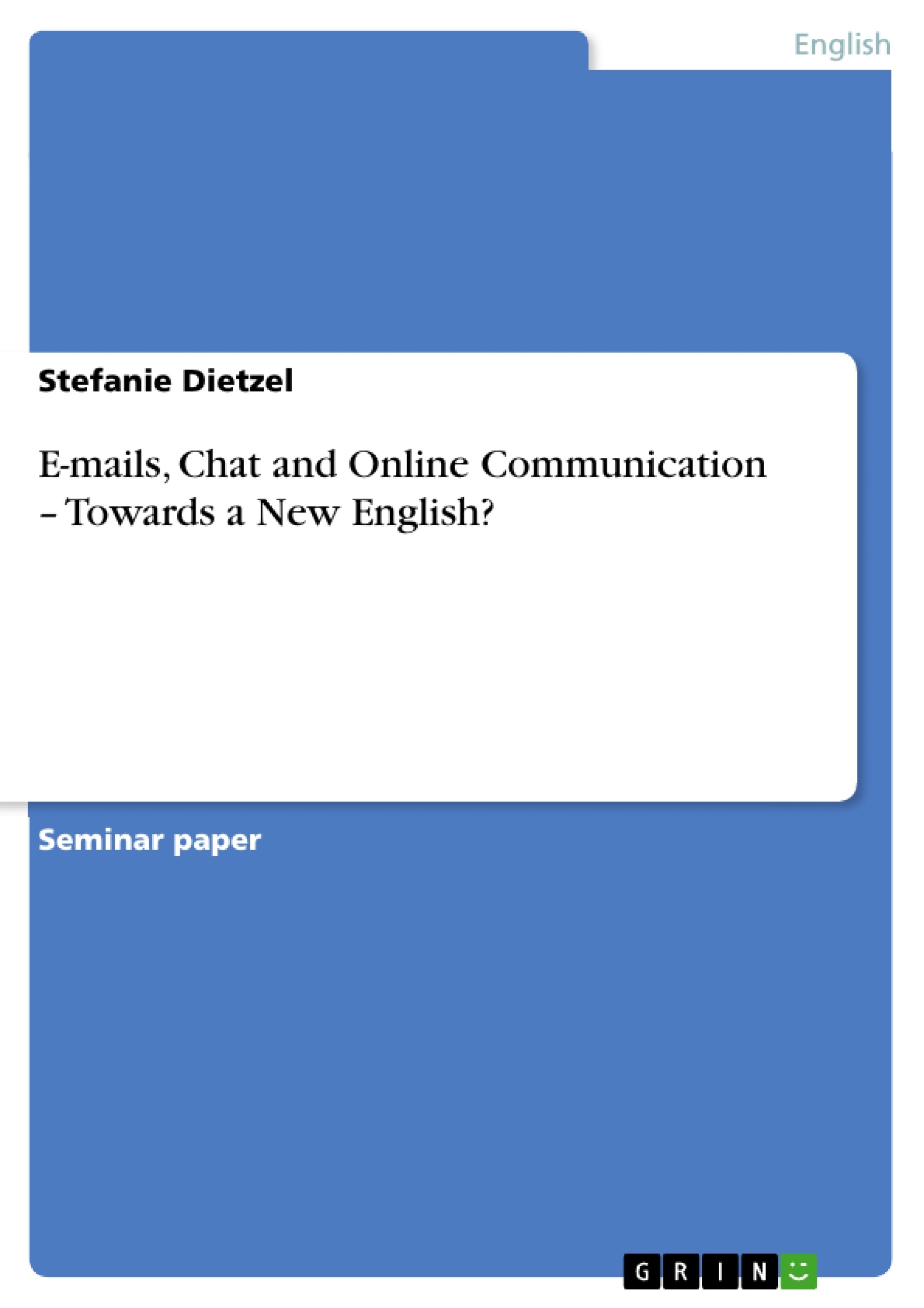But what consequences will the impact of the Internet on language have? Some people admit that the progress in technology can be very advantageous, but they worry about the quality of language and argue that its development brings about bad effects.
This paper will focus on the linguistic development of the English language, and try to find out whether the effect of the Internet plays a role. If so, what changes can we consider and how do they emerge?
First, an overview of the reasons for the development of languages will introduce the topic. The term registers will be defined in order to explain the different varieties of English.
We will then consider the different situations of language use in online communication. This paper will present the different technologies for online communication such as e-mail and chat and illustrate the use of language within them. Several examples will illustrate the main differences between traditional written language and language used on the Internet.
Inhaltsverzeichnis (Table of Contents)
- Introduction
- Language Variation in PDE
- The Development of Different Varieties of English
- Registers
- Examples of Registers
- Online Communication
- Background
- Technologies for Online Communication
- E-mails
- Chat
- Newsgroups, Mailing Lists, and Forums
- Multi-User-Dungeons
- A New English
- Linguistic Features of Online Communication
- Changes in Every-Day-Language
- Conclusion
- References
Zielsetzung und Themenschwerpunkte (Objectives and Key Themes)
This paper examines the linguistic development of the English language and investigates the potential impact of the internet on its evolution. It aims to identify and analyze changes in the language that might be attributed to online communication, focusing on the emergence of a “New English.”
- The development of different varieties of English, including historical influences and sociolinguistic factors.
- The concept of registers and their role in language variation.
- The impact of online communication technologies (e-mail, chat, forums) on language use.
- The linguistic features of online communication and their potential influence on the evolution of English.
- The potential emergence of a “New English” as a result of online communication.
Zusammenfassung der Kapitel (Chapter Summaries)
The first chapter introduces the concept of language variation and its historical development, particularly focusing on the influence of historical events and the emergence of pidgins and creoles. It further examines the impact of the Internet on language, highlighting concerns about its potential negative effects on the quality of language.
The second chapter explores the various uses of English in different communities and social groups, specifically through the concept of registers. It introduces the concept of dialectology and sociolinguistics, examining the work of linguist William Labov. This chapter also discusses the role of social background and context in language use, and how the globalization of English has influenced its evolution.
The third chapter examines the different forms of online communication, including e-mail, chat, newsgroups, mailing lists, and forums. It explores the specific features of language use in these contexts, highlighting the differences between traditional written language and online communication.
The fourth chapter delves into the linguistic features of online communication and their potential impact on everyday language. It analyzes how the characteristics of online communication might influence the development of English and potentially contribute to the emergence of a new variety of the language.
Schlüsselwörter (Keywords)
This paper focuses on the English language, online communication, language variation, registers, dialectology, sociolinguistics, pidgins, creoles, linguistic features, and the potential emergence of a "New English."
Frequently Asked Questions
What is the main focus of this linguistic paper?
The paper examines the linguistic development of the English language and investigates how the internet and online communication influence its evolution.
What are "registers" in the context of English language variation?
Registers are defined as different varieties of English used in specific situations or social contexts, which the paper uses to explain language variation.
Which online communication technologies are analyzed in the study?
The paper presents and illustrates language use within e-mails, chats, newsgroups, mailing lists, forums, and Multi-User-Dungeons.
How does online communication differ from traditional written language?
The study highlights several linguistic features and examples that differentiate the informal, rapid nature of internet communication from traditional formal writing.
What is meant by the term "New English" in this research?
"New English" refers to the potential emergence of a new variety of the English language resulting from the unique linguistic features developed through online communication.
- Quote paper
- Stefanie Dietzel (Author), 2007, E-mails, Chat and Online Communication – Towards a New English?, Munich, GRIN Verlag, https://www.grin.com/document/133409



